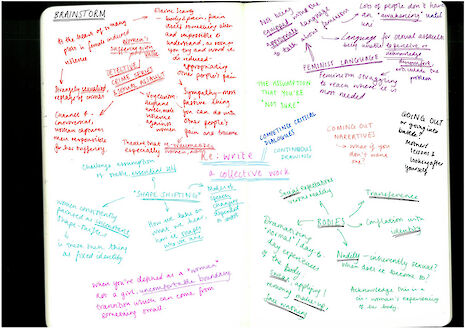Re: write preview: ‘inherently daring, fresh and real’
A piece of original writing, Re: write comes to the Judith E. Wilson Drama Studio as part of the FNTM Arts Festival

Re: write is very literally a re-writing. “Three weeks before we were due to perform, we had the rights to our show revoked,” Director Eva O’Flynn explains. “We were initially shocked into silence, but, this was not in fact the end of matter. Re: write was born out of the rejection of our creative voices but has grown into an exploration of so much more”.
I spoke to Eva O’Flynn to find out more about the project. Her and her team have devised Re: write, “a dramatisation of the attempt to fill a creative space”. The piece explores the struggle to create, particularly for women, and the fear of finding and losing your voice – something the all-female cast and crew have experienced first-hand.
The writing process wasn’t without its challenges. The team had had been preparing to perform a scripted play, and many of them have not had their writing publicly staged before. Considering the three-week turnaround and added pressures of Cambridge, the very act of having something to perform is pretty impressive.
O’Flynn explains that they started by just saying “let’s all write something. It doesn’t have to be good, it doesn’t have to be finished, it doesn’t have to be going anywhere, just put something down on a page, and within a week let’s try and have a script” – a refreshing approach in a theatre scene which can put a lot of pressure on perfectionism.
The team approached this in different ways: some coming back immediately with monologues that had been sat quietly at the bottom of drawers; others more slowly uncovering voices which had lain dormant for too long. It’s been an ongoing processes – the show gradually growing, and content still being added with less than a week before opening nights – which she describes as “an intense learning experience”.
Starting with Helene Cixous’ ‘The Laugh of the Medusa’, stimuli for the show have been varied, often drawing from “the smallest, most everyday experiences”. Throughout the devising process they have been “mulling over what makes us angry; thought about how we, as cis-women, interact with our bodies, as well as with our voices”.
While O’Flynn describes her initial disappointment at losing performance rights (over a dispute about cuts), she explains that she is “genuinely glad to have been forced into a position to have now created what we have. It’s hard when you’re told that your voice isn’t worthy of the art you want to create, but this show has become about learning that each of our voices are valid in themselves”.
Re: write will be performed as immersive theatre, meaning that the audience will follow and be involved in the adventure of the play. Here, O’Flynn describes the adventure in which the audience will be involved as “a discovery of a creative flow”. For the first part, the theatre will form a gallery space which will then move into a performance – facilitated by the versatile nature of the Judith E. Wilson Drama Studio.
I ask O’Flynn about what audiences can expect. “The show is so varied, ranging from being ridiculous and hilarious to sincere and raw,” she tells me. “I can’t predict what an audience will feel, which specific section or voice will speak most to each individual, but I do hope that people leave feeling like art is not above them and that their voice is worth hearing, even if it is scary at the start”.
In a show which may prompt the audience to laughter or tears, what the team are perhaps most proud of is covering material audiences won’t previously have heard on stage. She explains: “it’s new writing at its most raw and fresh, we’re kind of presenting up our vulnerability and insecurity to help people feel less alone in these frustrated emotions and to say that an imperfect voice is a valid one”.
Presenting this original and intimate work is “a bold statement which is inherently daring, fresh and real. We’re still not entirely sure what this show looks like, and we want our audiences to help us find out”. If that’s not an incentive to snap up a ticket, I’m not sure what is.
This show is part of the FNTM (female, non-binary, trans male) Arts Festival: a programme of events which showcase the work of individuals disadvantaged by the gender paradigm. While O’Flynn is keen to say that she’s not speaking for everyone, she nonetheless feels that that these identities have “a limited representation in the ‘Greats’, whether that be in the arts or political spheres”. The show seeks to challenge and address the problem that “when you are consistently made to feel that your voice is not worthy, it’s really hard to tell yourself that it is”.
Re: write is on in the Judith E. Wilson Drama Studio 22-23 February
 News / Clare Hall spent over £500k opposing busway 24 December 2025
News / Clare Hall spent over £500k opposing busway 24 December 2025 Comment / The ‘class’ of Cambridge24 December 2025
Comment / The ‘class’ of Cambridge24 December 2025 News / Caius mourns its tree-mendous loss23 December 2025
News / Caius mourns its tree-mendous loss23 December 2025 News / Eight Cambridge researchers awarded €17m in ERC research grants27 December 2025
News / Eight Cambridge researchers awarded €17m in ERC research grants27 December 2025 Comment / League tables do more harm than good26 December 2025
Comment / League tables do more harm than good26 December 2025








